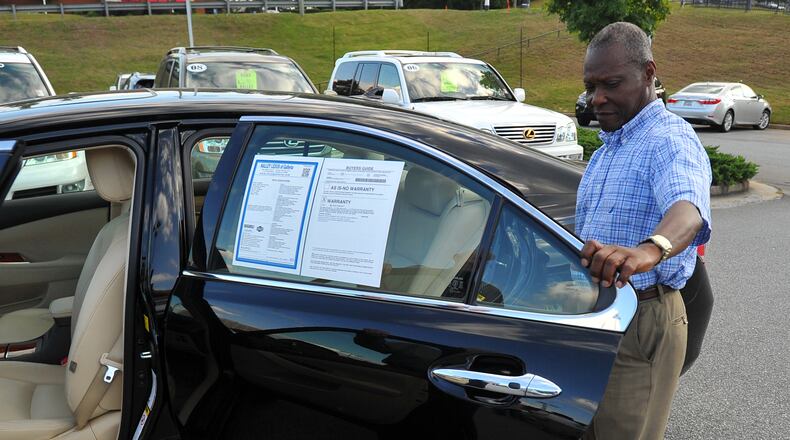After years of very public and expensive lobbying wars, the General Assembly quietly approved a deal between new- and used-car dealers that will mean lower taxes for Georgians buying cars starting Jan. 1.
For some Georgians, Senate Bill 65 may mean higher taxes when they buy used cars if Gov. Brian Kemp signs it into law.
The measure was passed with no fanfare at the end of the 2019 session, which finished up Tuesday. The bill ended, at least for now, a battle that had been going on annually since the General Assembly changed how auto sales were taxed seven years ago.
"We finally have an agreement between the new-car dealers and the used-car dealers," state Sen. Tyler Harper, R-Ocilla, announced from the Senate floor just before the final vote. "All industry partners are supporting it."
After years of fights on car taxes, nobody raised any objections and the bill passed a minute later.
Under the measure, pushed for three years by state Rep. Shaw Blackmon, R-Bonaine, the tax rate you pay when you buy a car would drop from 7 percent to 6.6 percent starting Jan. 1. That rate would last until 2023.
That may not sound like much, but state officials estimate that it will save car buyers about $33 million to $34 million a year. On a new car sold for $25,000, the changed rate would reduce a buyer’s taxes by about $100.
The sticking point has been whether a used car would be taxed on the book value, or estimated value, of the vehicle or its sales price, which is generally higher. Currently, new cars are taxed on the sales price. Under legislation passed in 2012, used cars are taxed on the book value.
Blackmon’s measure taxes used cars sold by dealers on the sales price unless they are sold through used-car dealers who finance the sale. Those businesses, which tend to have more lower-income buyers, would continue charging the tax based on the book value of the car. Person-to-person sales — such as your neighbor selling you his car — would also be taxed at the lower book value, as is currently the case.
Currently, if somebody buys a used car for $10,000 and owes the 7 percent tax, but the state values the vehicle at $8,000, that customer pays the taxes on the $8,000, not on what he or she paid for it. The difference in taxes would be $140 in that scenario.
Under SB 65, used cars sold by dealers other than so-called “buy here, pay here” dealers would be based on the higher sales price.
So while the tax rate would go down, it would be calculated using the higher sales price.
Changing how some used cars are taxed would increase the tab for those buyers by about $30 million to $34 million a year, according to state estimates.
New-car dealers — who also sell about 40 percent of the used cars in the state — have lobbied for several years to see the state use the same basis — the sales price — for taxing both new and used cars. The House has supported the change in the past, but the Senate hasn't.
Used-car dealers credited Casey Cagle, who as lieutenant governor was the Senate president for more than a decade, for killing the new-car dealers’ proposals. Cagle received big campaign contributions from both sides in the fight, but he lost the 2018 Republican runoff for governor and left office in January. He was replaced by Lt. Gov. Geoff Duncan, a former state House member who didn’t have the same connection to the two sides fighting it out over car taxes.
One of the weapons both sides have used has been the checkbook.
In the two weeks in January leading up the 2019 session, the new-car dealers’ political fund contributed $59,000 to more than 100 elected officials in the Statehouse, including $6,600 to Kemp and $6,600 to Duncan, who replaced Cagle as the Senate president.
That was after spending $120,000 last year on candidates, including the same donations to Kemp and Duncan after they won the Republican nominations. Around the same time last year, the used-car dealers’ political action committee gave $3,000 to Kemp and $5,000 to Duncan. Dozens of auto dealers contributed to the campaigns of statewide candidates and lawmakers as well.
The two sides also weren’t shy about spending money wining and dining lawmakers. Through the end of March, the new-car dealer’s lobbyists reported spending about $5,000 on meals for lawmakers during the session. The used-car lobby reported spending about $1,200, including breakfasts for the Senate Republican and Democratic caucuses.
Stay on top of what's happening in Georgia government and politics at www.ajc.com/politics.
About the Author
Keep Reading
The Latest
Featured




